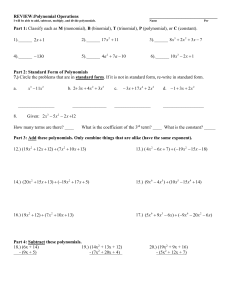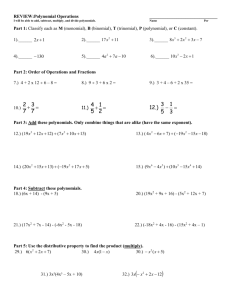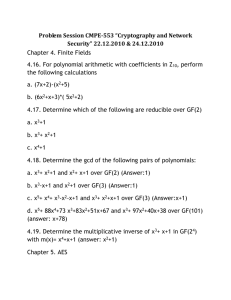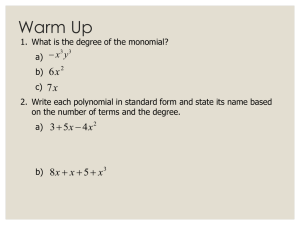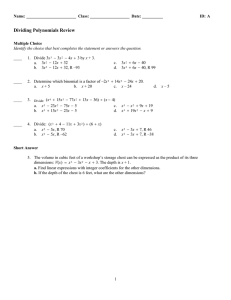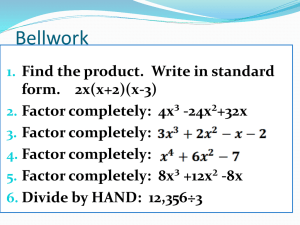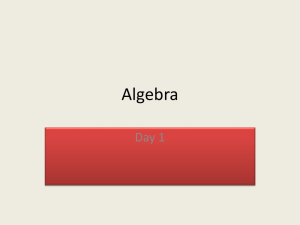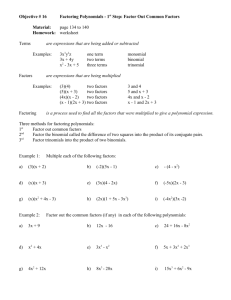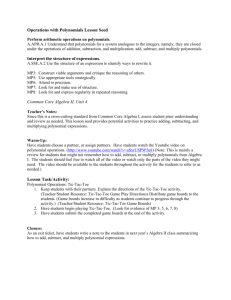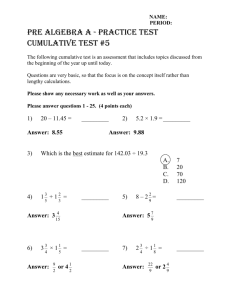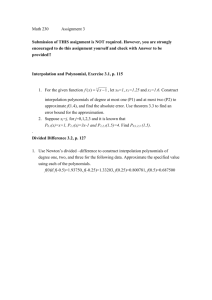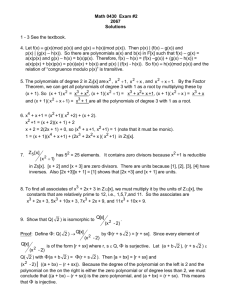Objective - To add and subtract polynomials.
advertisement
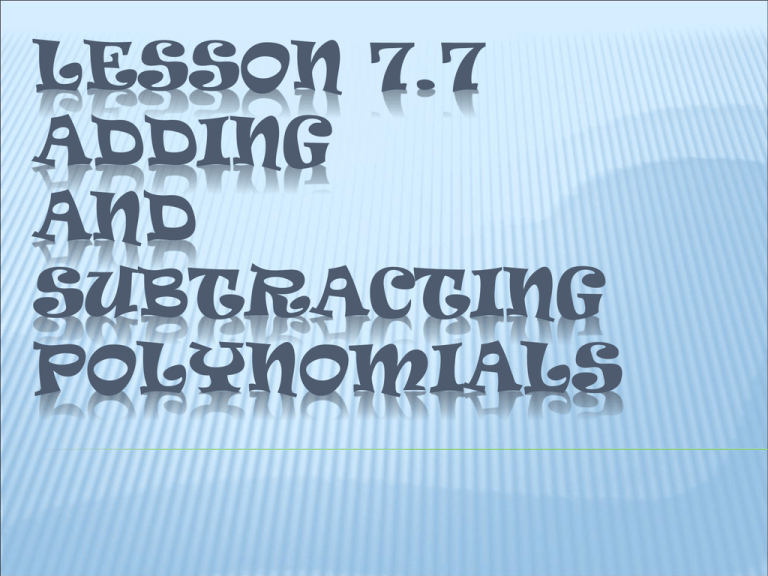
LESSON 7.7 ADDING AND SUBTRACTING POLYNOMIALS California Standards 10.0 Students add, subtract, multiply, and divide monomials and polynomials. Student solve multistep problems, including word problems, by using these techniques. Remember! Like terms are constants or terms with the same variable(s) raised to the same power(s). Adding Polynomials Horizontal Method (4x x 5x 7) (8x 2x 1) 3 2 3 4x x 7x 6 3 2 Vertical Method 4x x 5x 7 3 8x 2x 1 3 2 4x x 7x 6 3 2 Add the polynomials. 1) (6x 4x 3) (9x 6x 11) 3 3 15x 2x 8 3 2) (7y 9y 6) (3y 10y 8) 4 2 3 2 7y 3y y 14 4 3 2 3) 4x 2 5x 2 2 3x 4x 7 4) 6m 3 2m 2 m 3 m 7m 10 7x 9x 5 5m 2m 6m 10 2 3 2 Remember! When you use the Associative and Commutative Properties to rearrange the terms, the sign in front of each term must stay with that term. Opposite of a Polynomial (a b c) a b c Simplify. 1) (x 4x 9) 3 3) (t t 9t 2) 4 3 x 4x 9 t t 9t 2 2) (y 2y 7y) 4) (5y 8y 9y 3) 3 5 3 y 2y 7y 5 3 3 4 3 2 5y3 8y2 9y 3 NOW YOU TRY… 1) (y 5y 6) (y 2y 9) 2 2 y 5y 6 y 2y 9 2 2 3y 15 2) (6m 4m 1) (m 2m 6) 2 2 6m 4m 1 m 2m 6 2 2 5m 6m 7 2 Simplify. 3) (3p 4p 5) (2p p 7p) 3 2 3 2 3p 4p 5 2p p 7p 3 3 2 2 p 5p 7p 5 3 2 4) (9t 6t 8) (4t t) 2 2 9t 6t 8 4t t 2 2 13t 5t 8 2 Simplify. 5) (7x 3x 4) (9x 4x 3) 2 2 16x 2 x 1 6) (6t 8t t t) (t 6t 5t 8) 4 3 2 3 2 6t 4 8t 3 t 2 t t 3 6t 2 5t 8 6t 9t 5t 6t 8 4 3 2 Application A farmer must add the areas of two plots of land to determine the amount of seed to plant. The area of plot A can be represented by 3x2 + 7x – 5, and the area of plot B can be represented by 5x2 – 4x + 11. Write a polynomial that represents the total area of both plots of land. (3x2 + 7x – 5) + (5x2 – 4x + 11) 8x2 + 3x + 6 Plot A. Plot B. Combine like terms. Write an expression that represents the area of the shaded region in terms of x. x+2 1) 2) 3 9 6 55 xx ++ 22 2x + 5 3x + 7 6(2x 5) 3(x 2) 9(3x 7) 5(x 2) 12x 30 3x 6 27x 63 5x 10 15x 36 22x 53 Write an expression that represents the area of the shaded region in terms of x. 2 2x 4 2 3x 2x 1) 2) 5 xx2288 8 7 33 6x 2 5x 7(6x 5x) 5(3x 2x) 8(2x 4) 3(x 2 8) 42x 35x 15x 10x 16x 32 3x 24 2 2 2 2 57x 25x 2 2 2 2 13x 56 2 Lesson Quiz: Part I Add or subtract. 1. 7m2 + 3m + 4m2 11m2 + 3m 2. (r2 + s2) – (5r2 + 4s2) –4r2 – 3s2 3. (10pq + 3p) + (2pq – 5p + 6pq) 18pq – 2p 4. (14d2 – 8) + (6d2 – 2d + 1) 20d2 – 2d – 7 5. (2.5ab + 14b) – (–1.5ab + 4b) 4ab + 10b Lesson Quiz: Part II 6. A painter must add the areas of two walls to determine the amount of paint needed. The area of the first wall is modeled by 4x2 + 12x + 9, and the area of the second wall is modeled by 36x2 – 12x + 1. Write a polynomial that represents the total area of the two walls. 40x2 + 10
